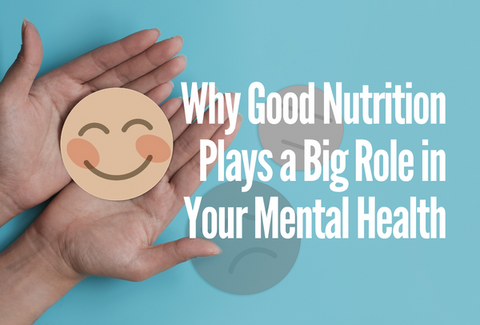Why Good Nutrition Plays a Big Role in Your Mental Health

There's a direct connection between what we eat and our emotions. Eating a healthy, nutritious diet can help you feel better. Think about it. The brain is always active, taking on different tasks like decision making, regulating the body hormones, physical functions like movement, and keeping your heartbeat and breathing in check.
And these tasks need to be fueled by different nutrients. Even while asleep, the brain requires a steady supply of fuel. And so your diet directly affects the function and structure of your brain and, ultimately, your mood.
How Diet Affects Your Mood
Serotonin, a neurotransmitter, helps to regulate sleep and appetite, inhibit pain, and mediate moods. And about 95% production of serotonin occurs in your gastrointestinal tract, lined with a hundred million neurons.
In addition, the good bacteria enhanced by a healthy diet affects the production of serotonin and the function of these neurons. And when there are fewer good bacteria, you're likely to get inflammation, which can become a silent killer, contributing to cardiovascular disease, type 2 diabetes, cancer, and other health conditions.
Good bacteria in your gut improve the absorption of nutrients from your Diet, activating neural pathways traveling directly to the brain.
What is the Connection Between Traditional Diet and Good Mental Health?
Scientific studies show that eating a traditional diet reduces the risk of depression by 25% to 35%. These healthy diets are rich in vegetables, unprocessed grains, fruits, fish, and seafood with modest amounts of lean meats and dairy. These foods can also include fermented foods, which are natural probiotics.
A traditional diet is, however, void of refined or processed foods and sugars, which are low in nutrients and can contain harmful preservatives and flavors.
Health Tips for Good Nutrition & Mental Health
- Eat a balanced diet regularly to prevent your blood sugar level from dropping, a situation that can leave you feeling tired and bad-tempered.
- Always stay hydrated, as even mild dehydration can easily affect your mood, concentration, and energy levels.
- Eat the right balance of healthy fats. Your brain needs healthy fats for good functionality, and you can source them from olive oil, grapeseed oil, seeds, nuts, oily fish, milk, eggs, and avocados. At the same time, avoid trans fats in processed or packaged foods; they can negatively affect your mood and heart's health.
- Go for wholegrains, vegetables, and fruits; they are rich in vitamins and minerals, which can help your brain and body to stay healthy.
- Include some protein in your meals; these contain amino acids which your brain uses to regulate your mood.
- Watch after your gut health as it can reflect how you're feeling. Healthy gut foods include vegetables, fruits, beans, and probiotics.
- Control your caffeine intake, as an excess of it, can affect your mood and cause sleep problems; it can also make you irritable and anxious. Caffeine sources include coffee, tea, energy drinks, cola, and chocolate.
- Share meals with friends and family: There are multiple biological, psychological, and social benefits of sharing meals; it gives you a sense of rhythm and regularity and the chance to reflect on the day while keeping the connection with friends and family.
Bottom Line
Boost your mental health by eating plenty of fruits, vegetables, whole foods, and foods rich in omega-3 fatty like salmon. Eating cleaner, better, and more wholesome foods improves your mental health and wellness overall.
